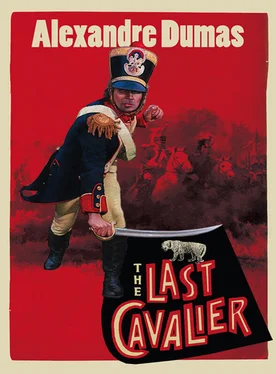“Citizen,” Duroc cried, “do you know whom you are speaking to?”
“I am speaking to a man who gave us his word as we gave him ours, who was bound as we were, and who had no more right to violate that word than did we.”
“He is right, Duroc,” said Bonaparte. “Still, we need to know if he’s telling the truth.”
“General, when a Breton gives his word.…” Sol de Grisolles cried.
“A Breton can be mistaken or tricked. Duroc, go get Fouché.”
Ten minutes later, Fouché was in the First Consul’s office. The former Minister of Police had scarcely cleared the doorway when Bonaparte called out, “Monsieur Fouché, where is Cadoudal?”
Fouché began to laugh. “I could answer that I have no idea.”
“Why do you say that?”
“Because I am no longer Minister of Police.”
“You still hold the office.…”
“… but am on the way out.”
“No more joking, Fouché. But, yes, you are on the way out. I am still paying you, however, and you still have the same agents, so you can still tell me what I need to know as you still are, technically, officially minister. I asked you where Cadoudal was.”
“As of now, he must be back in London.”
“So he had left England?”
“Yes.”
“For what reason?”
“To blow out the brains of a fellow who had assumed his identity.”
“And did he kill him?”
“Right in the presence of the fellow’s twenty men at the Plescop farm. But this man,” he said, pointing to Sol de Grisolles, “can tell you more than I can about the matter. He was close by when it happened. Plescop, I believe, is only two and a half leagues from Auray.”
“What?! You knew all that and you did not alert me?”
“Monsieur Régnier is prefect of police. It was his job to let you know. I am just an ordinary citizen, a senator.”
“So it’s clear, the prefecture is a job honest men will never know properly how to do,” said Bonaparte.
“Thank you, General,” said Fouché.
“Indeed. All you need is for people to think that you’re an honest man. In your place, Fouché, I would aim for something higher.
“Monsieur de Grisolles, you are free to go. As a man and as a Corsican, I accept the vendetta that Cadoudal announces. Let him defend himself, and I will defend myself. But, if he is captured, there shall be no mercy.”
“That is exactly how he expects it to be,” said the Breton with a bow, and took his leave.
“Did you hear, Monsieur Fouché?” said Bonaparte when the door had closed on the two of them. “He has declared a vendetta. It’s your job to protect me.”
“Make me Minister of Police once again, and I’ll be happy to protect you.”
“You’re a fool, Monsieur Fouché. As bright as you think you are, you’re a fool. For the less you are Minister of Police, visibly at least, the easier it will be for you to protect me, since no one will mistrust you. Besides, it has been only two months since I abolished the Ministry of Police, so I cannot very well restore it without good reason. Save me from some great danger; then I shall restore it. Meanwhile, I shall open for you a credit line of five hundred thousand francs from secret funds. Use it as you need, and when it runs out, let me know. Above all, I want you to see to it that no misfortune befalls Cadoudal. I want him taken alive!”
“We shall try. But to do that, he first needs to come back to France.”
“Oh, he’ll be back!—you can be sure of that. I’ll be expecting to hear from you.”
Fouché bowed to the First Consul, and, returning to his carriage as quickly as possible, he leaped up onto it rather than climbing inside, and called out, “Back to my office!” Once there, as he climbed down, he said to his coachman, “Go get Monsieur Dubois. And if possible, make sure he brings Victor along.”
A half hour later, the two men Fouché had summoned were in his office. Although Monsieur Dubois reported to the new prefect of police, he had remained faithful to Fouché, not on principle but for reasons of self-interest. He realized that Fouché’s disfavor would not last forever, so he was careful not to betray Fouché: not Fouché the man, but rather Fouché the minister who might make him his fortune. He, along with three or four of his best agents, like the especially skillful Victor, had remained completely at Fouché’s service.
There were two piles of gold stacked on the fireplace mantel when Dubois and his agent entered the office of the real Minister of Police. Victor, a man of the people, had not had the time even to change his clothes.
“We did not want to waste a single moment,” said Dubois. “I bring you one of my most reliable men, dressed just as he was when I received your message.”
Without answering, Fouché walked over to the agent, and, attending Victor with his cross-eyed gaze, he said, “Damn it, Dubois. This may not be the man we need after all.”
“What kind of man do you need, Citizen Fouché?”
“I’ve got a Breton leader we have to follow, perhaps to Germany, certainly to England. I need a respectable man, someone who can shadow him with ease, inconspicuously, in cafés, in clubs, and even in parlors. I need a gentleman, and you have brought me a bumpkin from the Limousin.”
“Oh, how true!” said the agent. “I’m not one for cafés, clubs, and parlors very much, but drop me into taverns, popular dances, and cabarets and you’ll find me in my element sure.” He winked at Dubois, who had been regarding his agent with surprise but was quick to understand.
“So,” said Fouché, “you must immediately send me a man who could comfortably attend an evening party at the regent’s. To him I shall give my instructions.” Taking two louis from a third stack of gold, he said to Victor, “Here, my friend. This is for the trouble you’ve taken. If I ever need you for more ordinary observations, I shall ask for you. But not a word to anyone about coming to see me here today.”
“Not a word,” said the agent, speaking in the accent of his region, “and I accept with pleasure. You ask for me, you say nothing to me, and you give me two louis to keep silent. Nothing simpler.”
“Fine, fine, my man,” said Fouché. “Now you may go.”
Both men returned to Fouché’s carriage. Fouché himself was a little annoyed to have wasted time, but since he had not told Dubois the sort of surveillance he required, he realized the fault was mostly his own fault.
Still, he did not have to wait long for the second man. Within a quarter of an hour, he was announced. “I said to let him come in!” he shouted impatiently. “Send him in!”
“Here I am, here I am, Citizen,” said a young man, about twenty-five or twenty-six years old, with dark hair and bright, intelligent eyes; he was impeccably dressed and looked to be quite familiar with high society. “I lost no time getting here, and here I am!”
“It’s about time!” said Fouché, as he studied him through his lorgnette. “You are just the man I need.”
After a moment’s silence. during which he continued his examination, Fouché asked, “Do you know what this is all about?”
“Yes! It’s about following a suspicious citizen, maybe go to Germany and surely to England. Nothing easier. I speak German like a German and English like an Englishman. Be assured, too, I shall never let him out of my sight. So all I need is for someone to point him out to me, or to see him once, or to know where he is and who he is.”
“His name is Sol de Grisolles, and he is Cadoudal’s aide-de-camp. He lives on Rue de la Loi, and his hotel is called L’Unité. He has perhaps already left the city. In that case it will be necessary to pick up his trail. I need to know everything he does.” Taking the two stacks of gold from the fireplace mantel, Fouché added, “Here. This will help you gather information.”
Читать дальше












